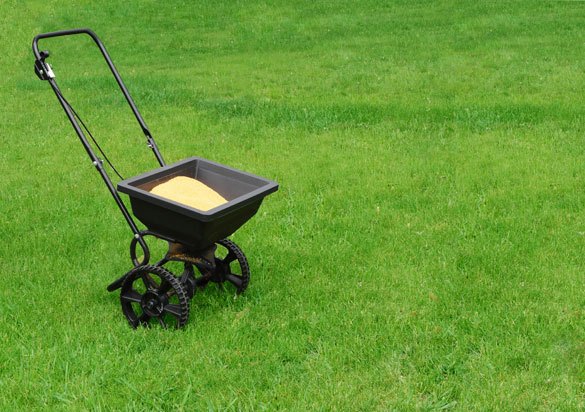There are a lot of gardeners out there who want to utilize lime to improve their soil but aren’t sure how to go about it. Another widespread misunderstanding is whether lime is a soil addition or a soil conditioner. Lime is a soil amendment for some, while soil conditioner for others. Again, a typical home gardener would be confused by this. Not to add that the proper use of lime and the benefits lime may provide your plants become even more mysterious.
First, let’s talk about the Signs when your garden needs garden lime.
Signs your garden needs lime
Yellow Grass
Lawn grasses like soil with a pH level of between 5.8 and 7.0, and they grow best there (the lower the pH, the more acidic the soil is). However, when the soil is too acidic and has a low pH level, microbial activity is slowed down, which means ivy plants and grasses can’t get the nutrients they need from the soil. This means that if your grass is yellow, dies in patches, or grows weakly even after you do everything you can to keep it healthy, you probably need lawn lime for recovery.
Weed Infestation
Many weeds like acidic soil. Dandelions, one of the most common and most aggressive weeds, grow best and quickly spread in acidic soil. If you see more weeds in your lawn grass, you might want to lime your lawn to get rid of them.
Fertilizers have no positive impact
Naturally, the first remedy that springs to mind when a lawn seems sickly is lawn fertilizer. I want to see a healthy lawn as a lawn care enthusiast. Our instinct is to provide nutrients to our grass to promote growth.
However, if your soil is acidic, even the fertilizer will be ineffective. Acidic conditions prevent plants from absorbing nutrients from the ground. When fertilizers are ineffective, it’s time to try liming your grass.
Moss in the Lawn
Mosses, like weeds, like acidic soil. Look for regions that are dark and wet. If you see moss growing around the base of oak trees and spreading out into the main areas of your lawn, this is a vital sign that your grass might benefit from lime treatment. So it’s time to use Lawn lime against moss.
Sandy or Clay Soil
Certain soil types are more acidic by nature. Clay soils are more acidic in nature, but sandy soils promote run-off, removing calcium and other pH-balancing substances from the ground. If your grass was established on one of these soil types, it almost certainly needs lime. Lime should be applied every 2-3 years to maintain healthy grass growth on sandy soil.
Excessive Rainfall
Whether it’s a stormy winter, a barrage of storms, or a soggy spring, significant rainfall might need the lime application to your grass.
Water draws calcium and magnesium naturally from the soil, resulting in a more acidic pH. If you’ve had unusual weather patterns in recent years or live in an area that receives a lot of rain, buy lawn lime to apply to your grass to prevent growing soil acidity.
Benefits of Garden Lime
Below are the advantages of adding lime to the soil:
Helps Improve Soil Activity
Generally speaking, plants can better take nutrients from the soil when there is activity. Soil-forming characteristics that come from utilizing garden lime include enhanced earthworm activity and a multitude of microorganisms working to enrich the soil.
When the soil is acidic, these creatures cannot thrive. Consequently, this soil supplement makes the soil less acidic, producing a pleasant habitat for beneficial organisms.
Adds Calcium to Soil
Calcium carbonate is the principal active ingredient in agricultural lime. As a result, it may supplement calcium in soils with a low pH level.
Additionally, ag lime has a trace of magnesium, another necessary component for crop productivity.
Improves Soil Texture
Agricultural lime may enhance soil texture by enabling water to soak into the soil rather than pool on top of it, therefore supplying water to the plants’ roots.
This will also aid in binding sandy soil and loosening clay soil, allowing for improved drainage and aeration.
Controls Garden Pests
Lime powder is quite dusty. Consequently, when some insects are powdered with it, they cannot breathe normally.
Additionally, it makes crawling through it more difficult for some insects. However, care should be used since ag lime may potentially harm beneficial insects.
Lime for Field and Raised Bed Gardens
Due to unexpected rainfall and considerable field nutrient depletion, a field garden might necessitate the reapplication of lime. However, raised beds don’t require as much lime as an open field because most of the nutrients in the soil are confined and don’t decrease with rain run-off.
Vegetables That Love Lime in Soil
Numerous veggies enjoy a pH range of 6 to 6.5. If the pH of your soil is less than 6, lime should be added to raise it to a more desirable level.
● Beans, cabbages, peas, spinach, lettuce, and other green plants thrive when lime is added to the garden soil.
● Tomatoes will not thrive in acidic soil. Lime replenishes the soil with necessary calcium and magnesium.
● You do not want to add lime to a pH neutral soil (7 pH) since the pH level is already optimal.
The critical point to keep in mind is always buying high-quality lawn lime products and using them within the limit. The use of low-quality garden products and in excess can cause additional damage to your lawn.

